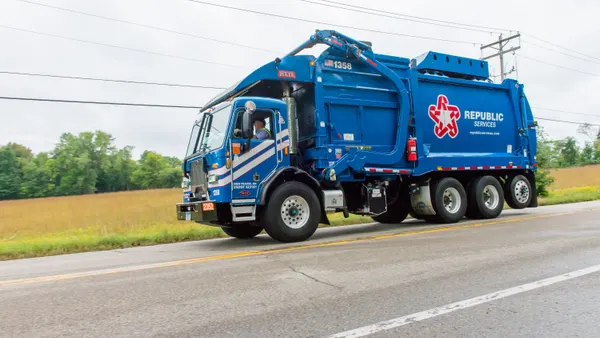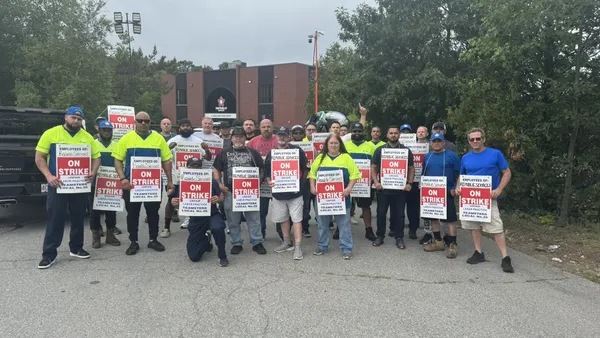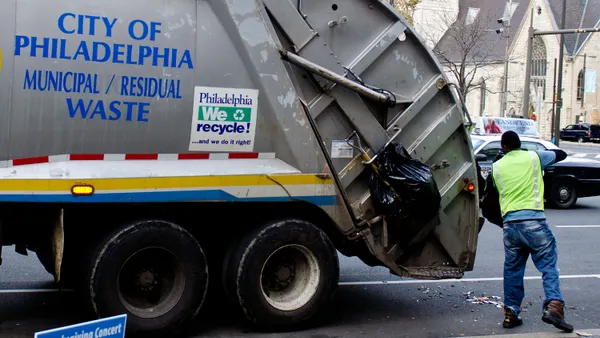Dive Brief:
- Speaking at the Northeast Recycling Council (NERC) "Markets or Bust" workshop, Myles Cohen, president of Pratt Recycling, touched on several topics, including the volatility of commodities markets and the ineffectiveness of recycling rates. He said that recycling rates are "not as meaningful" as they could be, and that there are "no rules" on how to measure things across different jurisdictions.
- With China implementing stricter rules on scrap imports, it was "always a matter of when," not a matter of "if" they would implement such restrictions. But, Cohen says, some of the causes of the new rules — namely, contamination — were self-inflicted wounds. "We as an industry need to fix this," he said. "We did this to ourselves."
- Cohen said the push to include more and more materials is part of what caused contamination. Instead of focusing on recycling rates, he said, local governments should focus on recycling quality. "If you have a high recycling rate, with low quality, it could result in the demise of programs," Cohen said. Instead of asking MRFs whether something can be recycled, local governments should be asking what MRFs want to see in the bin and, importantly, what kind of material viable markets exist for.
Dive Insight:
One of Cohen's biggest problem stems from the "big blue bin," which encourages participation but can sacrifice quality. While he did not go so far as to advocate for dual stream or household separation, he did push for a simpler approach.
"I think the pendulum went way too far, sort of putting everything in the bin," Cohen said. Now, recyclers need to push back the other way, and find a new "equilibrium."
At a recent sustainability forum, hosted by Waste Management, Cohen said it may be time for a "moratorium" on recycling new items, in order to protect residential recycling programs.
While a large percentage of recovered material is generated at the commercial level, municipal programs are more able to influence and direct residential recycling, according to Cohen. And because of that, cities and other local governments need to push hard for "quality" and show "no tolerance for contamination."
He pointed to The Recycling Partnership (TRP) as a positive force. TRP has worked with Chicago, for example, and saw a 32% decrease in contamination. TRP recently joined with Garland, TX to help fund recycling carts — the organization's first such move in the Lone Star State.
Pursuing quality, rather than quantity, can help protect the value of commodities and make it easier to find potential buyers for recycled material. The markets for #3-7 plastic are struggling right now, Cohen said, but HDPE and PET are "relatively healthy," and there are buyers of recycled paper — such as Pratt — domestically.
And if domestic markets prove difficult, there are international options outside of China. Recent data from the Institute of Scrap Recycling Industries (ISRI) has shown that some countries, including India, Malaysia, and Vietnam, increased the amount of scrap they imported in 2017, YoY.
And, while China may be unlikely to yield on its new policies, there is evidence that points to Chinese businesses looking to find ways around the import restrictions.
"There has been some infrastructure, mainly in places like Indonesia, and other places in Southeast Asia, where some plastics recyclers in China are actually moving and setting up shop in some other places to accept plastic," in markets with a low labor cost, Cohen said.
There are also a handful of Chinese-owned businesses opening recycling facilities in the United States. The most recent example is Ecomelida in South Carolina, which will focus on recycling cartons, and Shanghai-based Roy Tech Environ is investing in a facility in Alabama.
Commodities markets are tricky right now. Prices are fluctuating and recycling is becoming more expensive. Local programs need to adapt to the changing circumstances, including the complicated global trade system that scrap is a part of.
While it can be tempting to try and incorporate more materials into the recycling stream, and to brag about having the highest recycling rates, that might not be the right approach at this point.
"Bottom line, back to basics," Cohen said. "At least for now."










